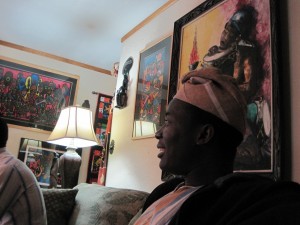I’ve been trying to find the right words to sum up this year. When I look back, there is an enormous bank of memories (some of them very personal) that I carry. There is that very first day of the year spent in the good merry company of my a friend, a Fulbright colleague, and my friend and fellow blogger Clarissa (and her husband). We had the most delicious cake, a great food, and a merry time into the night. Then there is that delightful trip to Chicago in July which changed my life in a remarkably delightful way.
 It was this year when we protested against Mubarak using social media. I wrote this poem for him in January a few days before he was actually kicked out. Fun times. Little did I know that other tyrants would fall after him: Gaddafi, Osama, Laurent Gbagbo, and Kim Jong Il. Two of those dying tyrants were mentioned in the title of the poem. If I was a betting man, I could be rich by now. I also remember 2011 for The King’s Speech, one of my most favourite movies of all time.
It was this year when we protested against Mubarak using social media. I wrote this poem for him in January a few days before he was actually kicked out. Fun times. Little did I know that other tyrants would fall after him: Gaddafi, Osama, Laurent Gbagbo, and Kim Jong Il. Two of those dying tyrants were mentioned in the title of the poem. If I was a betting man, I could be rich by now. I also remember 2011 for The King’s Speech, one of my most favourite movies of all time.
This year, I met Ken Burns and Niel deGrasse Tyson – two brilliant writers opinion makers. I also visited Joplin in what will remain one of my year’s most enduring memory. I’ll also remember the year for losing my last surviving grandmother in January, then an aunt in March. Not very happy feelings about that. In 2011, the St. Louis Cardinals won the World Series, a surprise. I did not write as many posts this year as I did in previous years, deliberately. Academics have taken much of my attention, inevitably. Thank you for forgiving :). Now, if we listen to the Mayans, all the remaining negatives on the world’s plate point only to one conclusion: this will be our last New Year celebration. (I haven’t seen that movie 2012, but I’m very familiar with its apocalyptic premise).
 So here we are: Iran on the way to nuclear armament, the US selling new arms to Saudi Arabia, a small but skilled group of homicidal religious maniacs are blowing people up in Nigeria with the hopes of setting up an islamic government, Syria is on a murderous rampage on its protesting citizens, Egypt is unstable, and the Isreali-Palestinian conflict is not any nearer to resolution than it was fifty years ago. If the Mayans are to be believed, whatever needs to happen will begin to happen when the new president of the United States takes office in November 2012. Ron Paul? That’s a scary thought. But by then, I will be as far away from this place as possible, most likely in the arms of someone I love. Is there a shuttle service out of this planet?
So here we are: Iran on the way to nuclear armament, the US selling new arms to Saudi Arabia, a small but skilled group of homicidal religious maniacs are blowing people up in Nigeria with the hopes of setting up an islamic government, Syria is on a murderous rampage on its protesting citizens, Egypt is unstable, and the Isreali-Palestinian conflict is not any nearer to resolution than it was fifty years ago. If the Mayans are to be believed, whatever needs to happen will begin to happen when the new president of the United States takes office in November 2012. Ron Paul? That’s a scary thought. But by then, I will be as far away from this place as possible, most likely in the arms of someone I love. Is there a shuttle service out of this planet?
So, there it is, a sum of my thought for the dying year. My favourite posts in the year was The News Paradox (and perhaps Advances in Indigenous Language Technology). Cool visits: Lewis and Clark.
May the coming year bring a smile to your face.
What were your favourite memories, posts, news?
